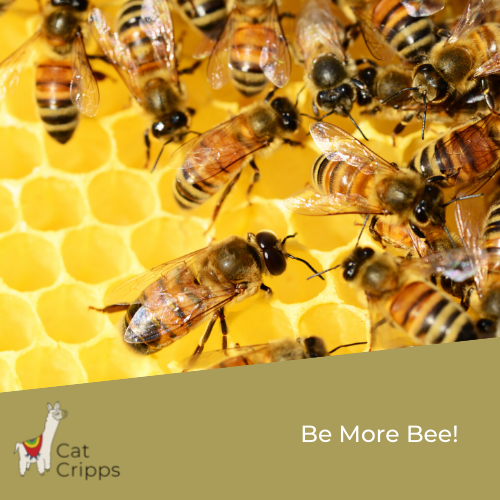As you may know I am currently travelling in Europe where I seem to be plagued by wasps (already been stung once) but they and their stripey friends the bees are to be encouraged. Bees in particular (along with other insects such as ants and termites) live socially and work together for the good of the community to bring success – So here we have 10 ways to Be More Bee, based loosely on the original article I read.
We must remember of course that bees do not have the complexity of our brains – with consciousness, imagination and a sense of future – so here are the ten points to ponder:
Teamwork with bees it is definitely a team effort (maybe only surpassed by ants or termites). They are the embodiment of the musketeers – one for all and all for one. The common good of the hive is everyone’s priority and if some bees cannot perform the others just get on with it, thus fostering a team spirit where no one is in competition and where we help others is a good thing.
Doing good for others – altruism – is there such a thing? We can have a philosophical argument about that some time! But – making sure that the flowers they need continue to flourish by pollination (which is not their main goal – they want pollen and nectar for the hive) ensures there are flowers for them to visit for those in the future. They don’t know they are doing this of course – but it shows us that we need always to be mindful that the health of the “environment” is key to ongoing success. Environment in this context does not just mean the physical environment – it also encompasses the business “ecosystem” in its entirety.
Efficiency – focus on priorities – stick to what needs to be done. Well of course as humans we have other priorities in life – but living to your purpose is no bad thing! But yes we have the opportunity to raise a family, appreciate the arts or whatever – as well as our “purpose”
Live within your means – only expand the hive if necessary if population grows and to store more food – not always having to keep up with the neighbours by having the fanciest car or
otherwise spending money they don’t have.
Evolve – adapt to surroundings. NOT “we’ve always done it that way”. Find new food sources and communicate to others – don’t moan cos the old source is gone (You may recall the book “Who moved my cheese” where it is shown success comes to those who adapt).

Seize the day – Carpe Diem. This is similar to the previous one – but is all about making the most of the time they have available to them. You really don’t want to wake up one day and wonder what you have been doing all your life!
Live your work ethic – bees are responsible team members, they work hard and keep the colony going. This doesn’t really need any explanation?! There is no “micromanagement” everyone is just trusted to keep everything working. Have you got a culture in place to make that happen?
Be a true leader – I’ll quote this bit from the original article: Colonies have queens, without the bureaucracy or the dictatorship. The queen knows her role and she performs her duties without interfering with the work of her subjects. And although the bees depend on their queen, she still behaves as a servant to her hive. Elements of true leadership – right there!
Communicate well – we all know about bees communicating and waggling to show where the best nectar is to be found! Communication is essential to the well-being of the entire hive and keeping the colony going. It’s no different for us!
Take time to rest – notwithstanding the above, bees DO rest! Work hard but take time out too – which we also need to do – we can’t help others if we are spent.
I believe it is worth reflecting on these ten principles and for us to maybe be a bit more “bee” – and we can bee successful! The most successful business leaders look for ways to constantly improve, even in small ways, and so if we can adopt a tiny bit of this philosophy maybe we can Bee more successful.
As always, if you would like to talk more then please do Get in touch.
Designed By SMA Digital
